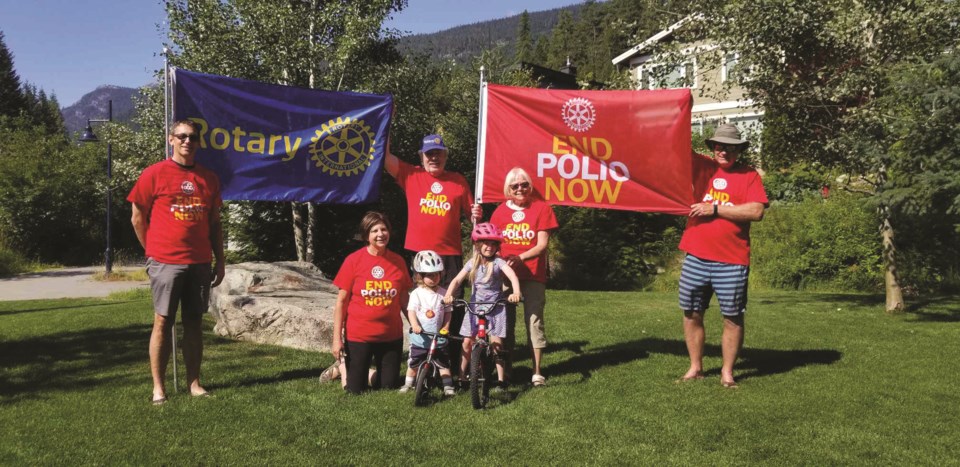Bobbie Rathbun still remembers the time as a child when she wasn’t allowed to go to the mall or the movie theatre or the local swimming pool over fear of coming into contact with large crowds.
While our widespread COVID-19 health protocols are new to most, for a certain generation, physical distancing was the norm as parents tried to protect their children from another devastating, infectious disease: polio.
“I know how happy my parents were when the vaccination became available [in 1955] and parents at that time were lining up to have their children vaccinated because it was such a deadly disease,” recalled Rathbun, chair of the Pedal for Polio initiative for the Rotary Club of Whistler Millennium.
Mainly affecting children under five, polio has largely been eradicated globally, although it persists in certain underdeveloped and often politically volatile countries, such as South Sudan, Afghanistan and Pakistan.
With the novel coronavirus stifling the world’s largest immunization program, global eradication efforts were suspended in late March, forcing more than 20 million doctors, technicians and other medical practitioners to put much of their work on hold and leaving at least 13.5 million children either unvaccinated or under-vaccinated, according to estimates by health organization GAVI, the Vaccine Alliance.
“As long as there are unvaccinated children in the world, there’s always a chance there will be a hotspot and it will take off. With global travel, it still makes our children vulnerable,” Rathbun said.
The burgeoning anti-vaxxer movement, both abroad and closer to home, has also exacerbated the problem.
“North America is at risk as well because of the anti-vaxxers,” noted Brian Brown, Rotary Club of Whistler Millennium president. “If kids don’t get vaccinated, it could come back. It’s a huge problem.”
Now both Whistler Rotary clubs, as well as the Pemberton and Squamish groups, are teaming up to raise funds for PolioPlus, Rotary International’s long-running program aimed at polio eradication and prevention, through a campaign that asks participants to secure donations for every kilometre they bike, walk or run between Aug. 29 and Sept. 6. With a local target of $20,000, every donation will be matched two for one for by the Bill & Melinda Gates Foundation.
The campaign is also designed to accommodate the current COVID times by allowing participants to take part from wherever they are.
“We just want to get as many people as we can supporting the campaign, because it’s something so easy to do. Kids can get their families no matter where they are to sponsor them,” said Gill Forester, Rotary Club of Whistler president.
A longstanding cause for Rotary clubs around the world, polio eradication has led to a level of collaboration among the corridor’s Rotary groups that was welcomed by members of both Whistler clubs Pique spoke with.
“It’s very rewarding,” Forester said. “I’ve just come on as president and one of my goals has been to get the clubs working together. The two things we’ve started doing together was obviously this Pedal for Polio [initiative] and the other thing we’re starting is a virtual Rotaract Club.”
The newly formed Sea to Sky Rotaract Club brings young adults from across the corridor together to take action in their communities and develop their leadership and professional skills.
“The four clubs have come together, canvassed and encouraged some young people and now they’re starting their own Rotaract Club and, of course, this is the perfect time to do it because a lot of our kids aren’t going off to uni in September,” Forester added.
Those interested in joining should email [email protected].
For more information and to sign up or donate to the Sea to Sky Pedal For Polio campaign, visit www.bit.ly/Rotary-Pedal-for-Polio.




